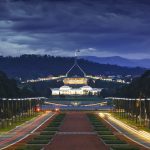Australia’s approach to asylum seekers
Australia’s approach to asylum seekers has become a strong talking point especially as the Government’s stance becomes harsher. Dr Jo Coghlan, lecturer in politics at Southern Cross University, explains the new Coalition Government’s policy and the lead up to it.
There are an estimated 15 million refugees in the world. In 2010-11 Australia granted visas to only 13,799. Yet, the issues associated with asylum seekers have dominated the national psyche since the Tampa was refused entry into Australia by the Howard Government in 2001.
Prior to this, as a nation of migrants, Australia appeared to accept the need to fulfil our obligations to the United Nations Refugee Convention, of which we are a signatory. As signatories we have a binding obligation to accept an asylum seeker who has a well-founded fear of persecution and we agree to not return them to their country of origin. This obligation applies regardless of the means of arrival and regardless of whether the asylum seeker has a valid visa or not. In the face of our international obligations, the issue of asylum seekers has been increasingly politicised.
When John Howard announced in 2001 ‘we will decide who comes to this country, and the circumstances in which they come’ it signified a shift in public attitudes towards the plight of the world’s most vulnerable men, women and children. Driving this attitude was not only the negative language adopted by politicians in linking asylum seekers to terrorists, accusing parents of throwing their children overboard, and claims that boat arrivals were illegal and queue jumpers, but the megaphone approach adopted by much of Australia’s mainstream media.
The unfolding tragedies of the Tampa Affair and the 2001 SIEV X tragedy, which claimed the lives of 353 asylum seekers including 146 children – and with asylum seekers mandatorily detained in remote and isolated detention camps and journalists denied access to them, the Australian public lacked a context in which to consider the arbitrary changes that were occurring to Australia’s 1958 Migration Act (the key legislative document that regulates asylum seeker practices).
Increasingly opinion polls indicated that Australian’s appeared to support policies under the auspices of border protection: parts of Australia were excised from the national geography, more detention camps were built, overseas contractors were employed to secure the increasingly prison-like facilities that asylum seekers indefinitely, and elections and leaderships were won and lost on who could appear the toughest on a few thousand asylum seekers who had survived the shark infested waters from Java to Christmas Island. That they had paid money to embark on the trip, rather than their desperation to flee persecution and find safe haven, became the issue within which they were judged and denied our compassion.
More than a decade latter little has changed. At the 2013 federal election, the Abbott-led Liberal National Party focused much of their campaign on ‘stop the boats’. While more rhetoric than policy, the now elected Abbott Government’s policies are worrying. A military focus on border protection is being ramped up with military-led operational chiefs reporting directly to the Minister for Immigration. Further, the Australian Navy will be ordered to tow asylum seeker boats back to their country of origin, likely Indonesia, but with no obligation for Indonesia to allow the boats to return to their sovereign waters.
A core element of the Abbott Government processing policy will likely be ‘Return, Remove, Resettle’. The language posits that refoulement or return to the country of persecution, which is illegal under the Refugee Convention, will be the likely outcome for most asylum seekers in Australia. Temporary Protection Visas (TPV), first introduced by the Howard Government and removed by the Rudd Government, will be reintroduced. TPV’s deny long-term protection, hinder the ability of asylum seekers to become Australian citizens, and reduce the rights of refugees to work or to contribute to Australian society.
Processing will be relocated to offshore facilities and asylum seekers will be denied due process under Australian or international law. This is particularly problematic for asylum seekers who arrive with no identification – as is often the case for those from Afghanistan who are denied official documents. For asylum seekers without identification documents, the Abbott Government has announced that based on the inability to prove identification the applicant will be denied refugee status. Amongst other harsh measures, the Abbott Government has also announced that it will decrease the number of places available under the Refugee and Humanitarian Program from 20,000 to 13,750 places with no places allocated to asylum seekers who travel to Australia by boat.
The Labor Opposition offers little hope to asylum seekers. Prime Minister Kevin Rudd introduced mandatory offshore processing for all asylum seekers who arrived by boat from July 2013, including women and children. That is, all asylum seekers who arrived by boat after July would be forcibly located on Nauru or Manus Island. For those who arrived in Australia by boat from August 2012 to July 2013 the ‘no advantage’ test was introduced. This means that asylum seekers in this period are given lower priority within the Special Humanitarian Program (SHP). For those who arrive after August 2013, they will have no access to family reunions. Further, these asylum seekers will not be allowed to work and can only access 89% of the lowest rate of social security payment.
Since 2010, the Labor Government had excised the whole of Australia for the purposes of immigration meaning that no asylum seeker arriving by boat could access due process in Australian courts. These policies were taken to the 2013 election campaign. That the government was defeated and the opposition elected on a military-style set of not dissimilar policies, bodes that Australian attitudes may not have changed little when it comes to asylum seekers, particularly those that arrive by boat.
However, there are some indicators that this may not be the case. Some politicians who had taken particularly tough approaches against asylum seekers were easily defeated in their seats, notably David Bradbury (Lindsay, NSW) and Sophie Mirabella (Indi, Victoria). Others suffered significant swings against them, particularly Bob Katter (Kennedy, Queensland) who lost votes to Clive Palmer’s United Party who campaigned on a more transparent policy setting and the standing down of militarised border protection. Adam Bandt (Melbourne, Victoria) easily retained his seat on the back of a compassionate approach to asylum seekers.
The recently announced decision by the Abbott Government to withhold information about boat arrivals is little more than Orwellian double-speak. Australian’s are smarter enough to know that ‘stop the boats’ doesn’t equate to ‘stop the information’. Neither is it a policy that adequately responds to the needs of asylum seekers nor fulfils our international legal and moral obligations.
Dr Jo Coghlan is a lecturer in politics at Southern Cross University, Coolangatta, Queensland. In 2001 she began visiting asylum seekers in Villawood detention centre. Since then she has written extensively on refugee rights. In 2005 Jo co-edited ‘Seeking Refuge: Asylum Seekers and Politics in a Globalising World (Halstead Press).













ken saloz
October 3, 2013 at 9:26 pm
What about us?
What about us? What about us?… In 2011, British Prime Minister David Cameron declared that state-sponsored multiculturalism was breeding generations of young people hostile to the British way of life. The German Chancellor, Angela Merkel, in 2010 described multiculturalism as a failed policy and argued those wanting to live in Germany should integrate. Central to overseas developments is the realisation that if societies are to survive and prosper there must be a commitment to citizenship and a willingness to support the institutions, values and way of life on which tolerance and respect for others are based. The "football size stadium" of asylum seekers Jessica Irvine once wrote of has already cost the Australian taxpayer $10 billion, but the ongoing cost to the treasury will be staggering as the greater majority of boat people are unskilled, and over 90% of them will be relying on Centrelink payments five years after arrival,and these refugees can bring in three relatives. Even Bob Carr admits that they are not refugees but political opportunists. This while our hospitals, scientific research, education, and just about all government programs are paying the price for this insanity- not to mention that while these asyum seekers are being housed in some very expensive digs, 105,000 Australians are homeless. (edited by moderator)
You and the left's open borders – "let everyone in crowd" can't seem to understand is there are basically two types of people who migrate to Australia – there are those who willingly adopt our values, assimilate and become contributing citizens, and there are those who will have crime numbers way outside of their numbers, will not assimilate and will instead aggressively seek to change our values and culture to their barbaric, illiberal and totalitarian force of pathological cruelty, and they will continue treat their women as nothing more than chattel – yet these are the people you want to bring their "diversity" here. Multiculturalism brings with it an increase in violent crime committed at a ratio vastly out of proportion to the ethnic numbers. (edited by moderator)
Every day there are some 350,000 babies born and most are born in the third world. As for Australia taking more refugees – just how many more can we take? 100,000? 500,000? A million? 5 million? Keeping in mind that these refugees can bring in three or more family members. Of course the Greens with their insane open borders "let absolutely everyone in" policy. would never place a cap on the numbers no matter how many came. And funding for their Marxist ideological insanities will be never a problem for the Greens because they will never hold government and so it is never even considered. Just as the planet is in the midst of an unprecedented population boom, and technological advances have combined to produce the largest and fastest migration waves in the history of mankind, Australia like many democratic nations have become so bogged down by idealistic human rights legislation and naive open border ideologies that they have now lost control over their own borders. City of Greater Dandenong Councilor, Peter Brown speaking about the Muslim African refugee crime wave in Dandenong: "Australia should not be the repository for global social and ethnic problems in the misguided belief that we can solve them, because as the world population increases beyond the already unsustainable levels more pressure will be placed on Australia to be a universal agent of global multicultural support. We will be doomed to failure… " As for "playing the fear and blame game" Irvine wrote of – The Australian taxpayer and those concerned with our security, crime and social cohesion have every right to do so.
tigerpom
December 21, 2013 at 10:45 am
Social worker perspectives on Australian asylum seeker
In the context of recent Australian policy, debate on asylum seekers has been highly political. However, Australia has a long history of accepting refugees since 1945. The number of people arriving unauthorized by boat in Australia is small in comparison to numbers worldwide. The intake of refugees has significantly impacted on the costs of processing and supporting arrivals. In terms of continued pressures, it can be expected that there may be continued pressure placed upon the system, with many claiming current policy settings are not a long term solution given global events.It can be seen that current government policy settings are opposed to contemporary social work practices, with large gaps between the two parties in terms of effectively meeting the social needs of asylum seekers. The peak body representing social workers has expressed concern in re-traumatising and unnecessarily creating social adjustment issues in regards to asylum seekers. It can be argued that as a relatively affluent country, Australia should be expected to demonstrate moral leadership on this issue. Human rights should be applied to all no matter what or who they are, including with seekers of political asylum.